Ep 77 Samantha Ward on zoo-based stockmanship and the importance of cross-industry communication

"Curiosity is key. Ask questions and break them down into smaller components and apply it to a study to create a fundamental understanding... it helps us progress from what we know to more knowledge" - Samantha Ward
Let’s welcome Dr Samantha Ward, a senior lecturer in animal science at Nottingham Trent University (NTU) who also manages the undergraduate bachelor’s degree in zoo animal biology. Furthermore, Sam works within the EAZA Records Working Group, a research advisor for Wild Welfare and is a welfare expert on the Zoo’s Executive Committee as part of Defra.
Sam shares with us how her love of animals came from her childhood through caring for her pets. She specifically reminisces of a goat named ‘Fudge’ which she entered a local race, which got mentioned in the local paper. Through work experience, Sam discovered the veterinary career was not for her. This led her to complete a BSc in Applied Zoology, an MSc in Animal Behaviour and a PhD in Animal Behaviour and Welfare. During t...
Ep76 Sven Wieskotten on positive reinforcement animal training and its utilisation in research

"The toughest part of animal training is that you find your own way, and not following rules. Because, following rules means there is no forward development" - Sven Wieskotten
Let’s welcome Sven Wieskotten for today’s podcast. He is the founding director of Animal and Training.
Sven first reminisces about his childhood bird and how far we have come in terms of animal husbandry. Then his first animal bond during his PhD with a Harbour seal named Henry. Sven noted his first career choice was being a pilot, however, due to unforeseen circumstances, he could not do this. So, he studied his second choice; biology, in 1997 at the Ruhr "University Bochum". During this, he met the founding director of the ‘Marine Science Center’ in Rostock, who introduced the research his team do on Harbour seals to his class. This started his passion, Sven enquired whether he could join their team. After seven weeks of enquiry, the centre got new seals and invited Sven to join.
Sven then describes the cent...
Ep75 In memory of Dr Hal Markowitz. Autumn Sorrells on behavioural enrichment, connections, and making a difference for animals

This podcast is dedicated to Dr Hal Markowitz (1934-2013)
"Hal argued that an unnatural stimulus is better than a natural environment with no stimulation."
- Autumn Sorrells
Let’s welcome Autumn Sorrell, the Animal Care Director at Elon Musk’s neuro-tech company, Neuralink. She attributes her career to being heavily influenced by the Father of Environmental Enrichment, Dr Hal Markowitz, with whom Autumn worked for the last 10 years of his life. As such, this podcast is the celebration of his life.
Autumn undertook an undergraduate agricultural animal science programme at the University of Missouri, Columbia and graduate work at Purdue University. She was granted a scholarship from the USDA to study livestock behaviour and learned to ask animals questions about their environment and preferences. During her undergrad, Autumn pursued various internships in different zoos, reading journals trying to learn more about the behavioural design of enclosures, including one by Hal. This pape...
Ep74 Brice Lefaux on primate conservation, research and his book Sauvons les primates
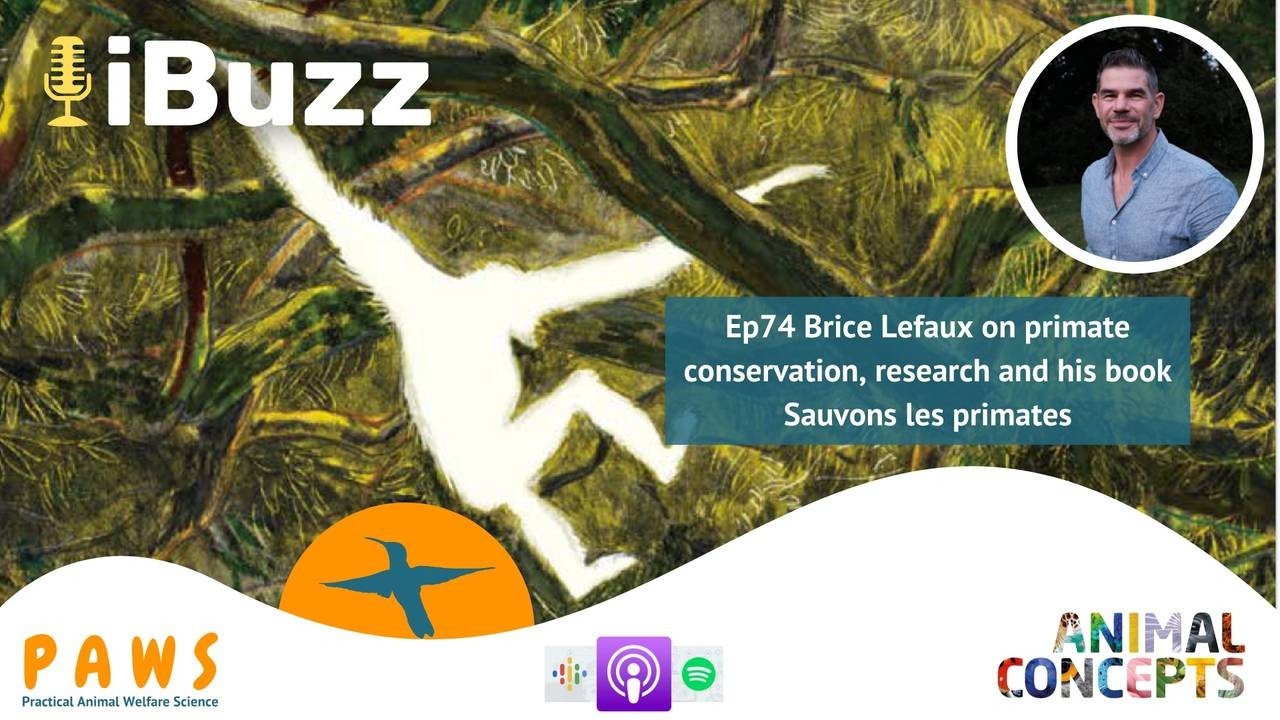
Let’s welcome Dr Brice Lefaux for today’s podcast as he takes us around the world to meet with the most endangered species of primates on earth.
It all started with Lily, the family dog. Growing up together, and learning to live with each other was probably the trigger to a life dedicated to animal welfare and conservation. One career option would be becoming a vet, although it wouldn’t be a match to his determination to make a difference.
Not realising at first how zoos could have an impact, Brice still decided to take a position as a Vet and Assistant manager at Bioparc de Doué la Fontaine. After a year, he experienced his first fieldwork in South America with Spider monkeys, a species of which he was studbook keeper back in Europe. There he realised that zoos were undeniable for the sustainability of field research and in-situ conservation actions. He felt a true connection to the wild and his long-standing passion for primates got even stronger.
For 21 years now, he has been...
Podcast Ep73 Magnus Wahlberg on bioacoustics, underwater noise and the interplay of ex situ and in situ animal conservation studies
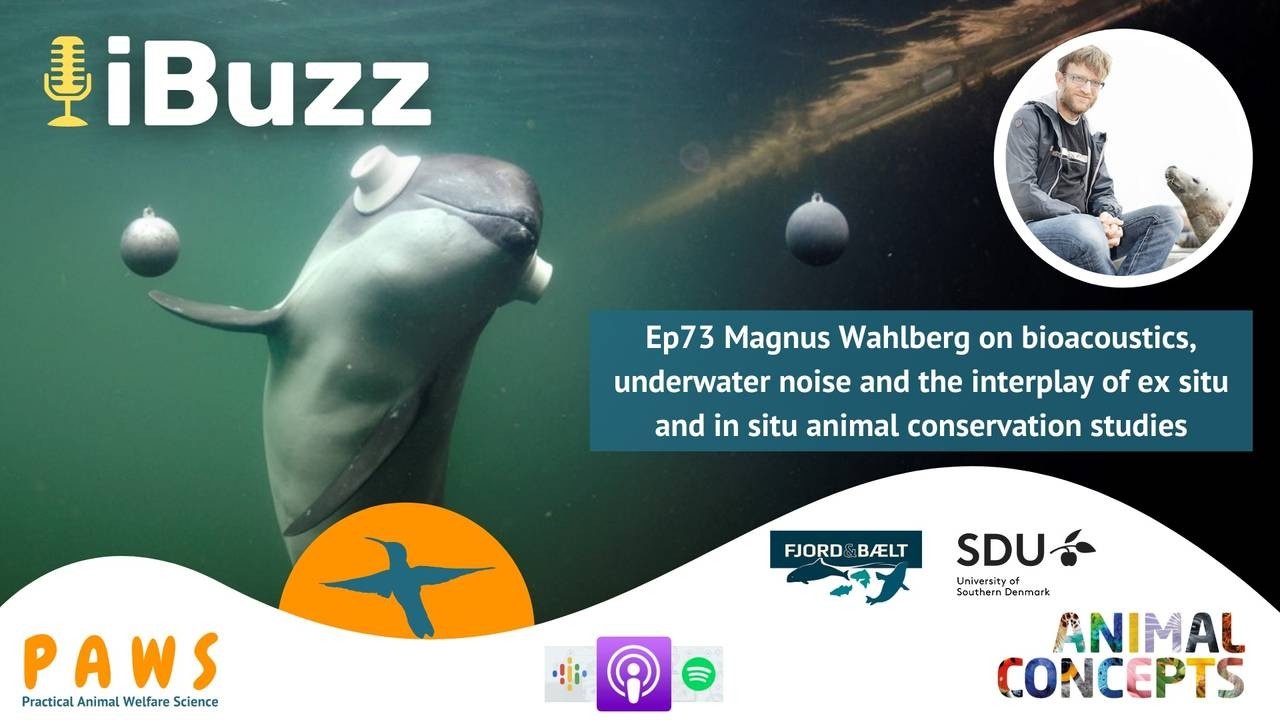
Magnus Wahlberg started out as a physicist and mathematician, even though he was more interested in biology. The thought of experimenting with laboratory animals put him off, and he felt field biology may not be his cup of tea.
Ironically, his voluntary work on marine animal sounds drowned him in fieldwork. He credits his mentors for their stimulating curiosity-driven approach. He had a long emotional journey of self-realisation that studying animals in captivity helps us know more about wild animals and vice versa.
Listen as Magnus tells us about his interesting work on the bioacoustics of marine animals. With many exciting examples, he explains his focus on how animals hear. He explains how captive animals help us test techniques before running field testing on wild animals.
“Would you rather be deaf or blind?” asks Magnus as he explains with relatable analogies. When vision underwater is limited, one has to rely on hearing. He shares how water is a good conductor of sound, making...
Ep72 Kirstin Anderson Hansen on positive reinforcement training for positive animal welfare and conservation
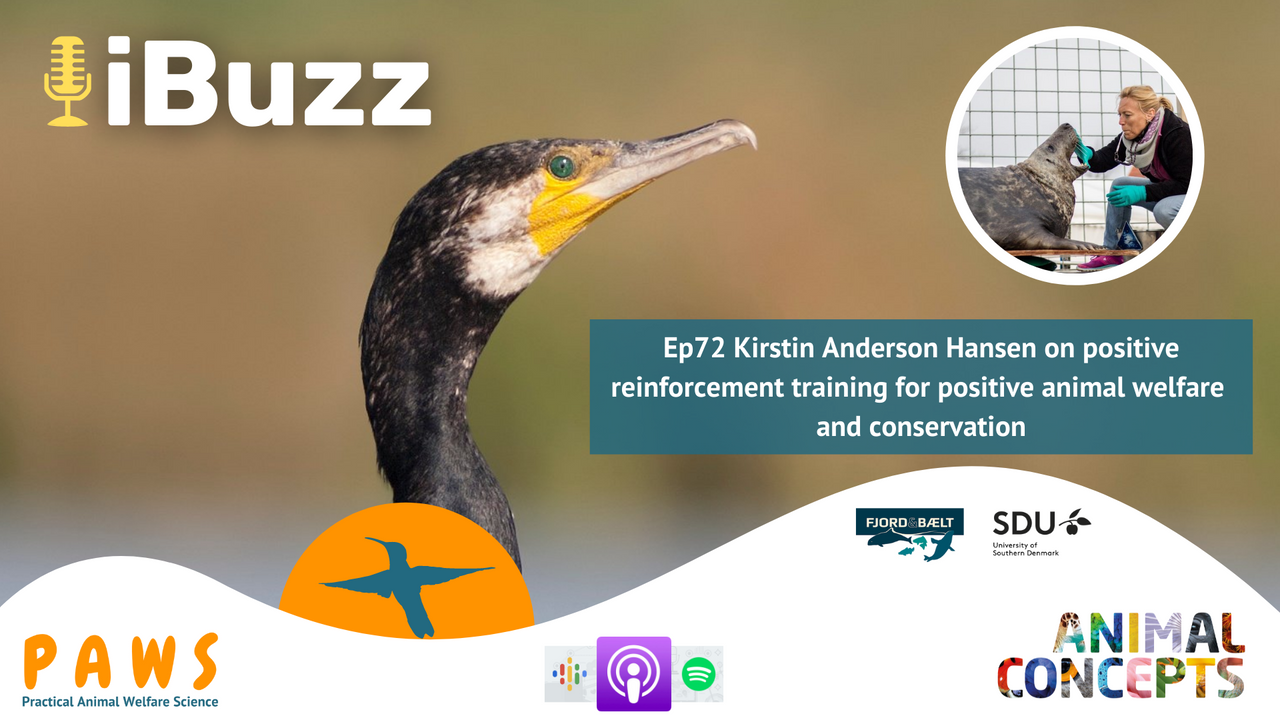
Let’s welcome Dr. Kirstin Anderson Hansen for today’s podcast as she takes us on an exciting life journey through her experiences in animal training and bioacoustics of marine animals.
As a 13-year-old, Kirsten encountered her first surreal sighting of swimming killer whales whilst journeying on a bike on the San Juan islands off the coast of Washington State. This set the course as a marine biologist for this Colorado girl, starting from high school to post-doctorate.
Kirstin shares how operant conditioning for communicating with animals is all about, “Teaching animals to be comfortable in the world that they live in!” She explains that training animals in co-operating for their own wellbeing is a priority. It helps showcase the animal’s natural behaviours and individual personalities for public education, she believes.
Although her MSc was related to bioacoustics of mimicry in beluga whales, her PhD involved training a great cormorant named Loke, taking part in an underwater behav...
Ep71 Hal Herzog on biological psychology and cultural influences on human-animal interactions
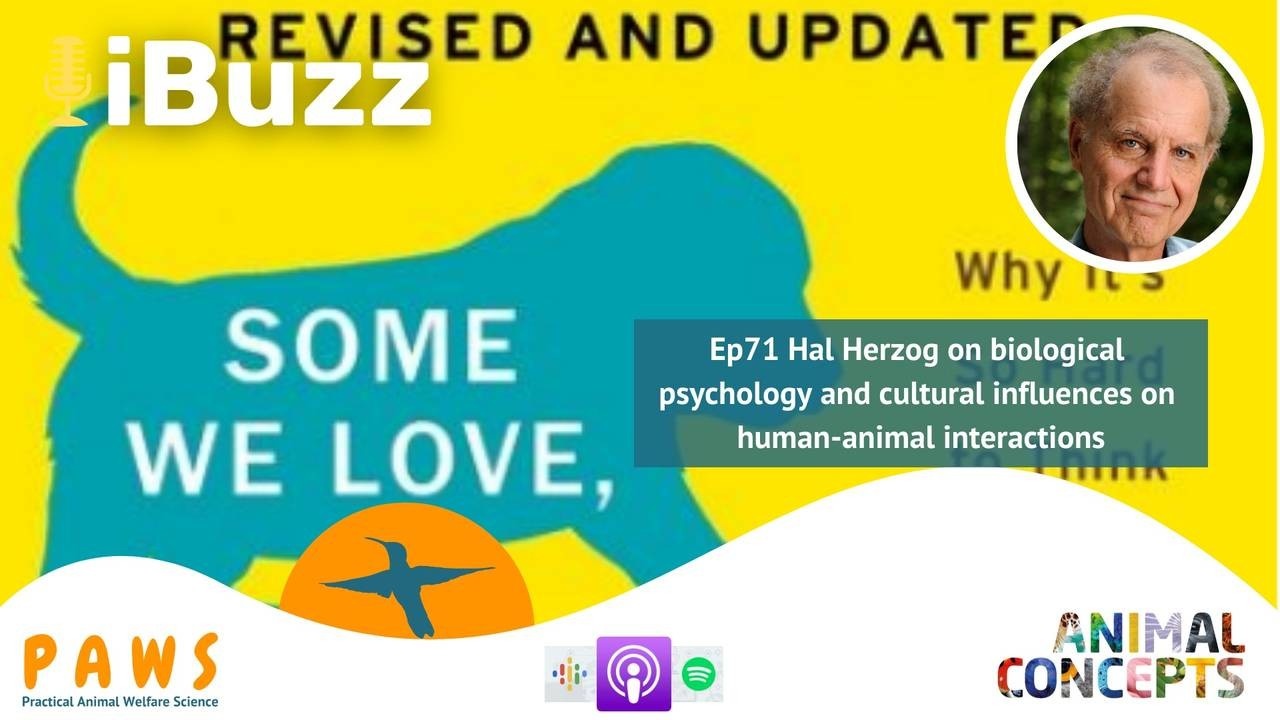
Hal Herzog is a professor of psychology at Western Carolina University, whose research entails the complex psychology of human-animal interactions for over three decades. These studies have been published in many journals, including Science, Animal Behavior and The American Psychologist to name a few. He also is the author of ‘Some We Love, Some We Hate, Some We Eat’ and writes the blog Animals and Us on Psychology Today.
Hal shares with us his love of animals from childhood, specifically reptiles. He quotes collecting reptiles during high school such as the boa constrictor, rat snakes, turtles etc. Hal then goes on to reference how his interest in human-animal interactions formed through his neighbours. They invited Hal to view a cockfighting match, which Hal initially refused. Eventually, Hal agreed due to his rising interest in how viewers perceive the roosters. This interest changed his PhD from snake personality differences to analysing the psychology of humans involved in cockfi...
Ep70 Jan van Hooff on the Royal Burgers Zoo chimpanzee colony, and the trials and tribulations of the social lives of primates
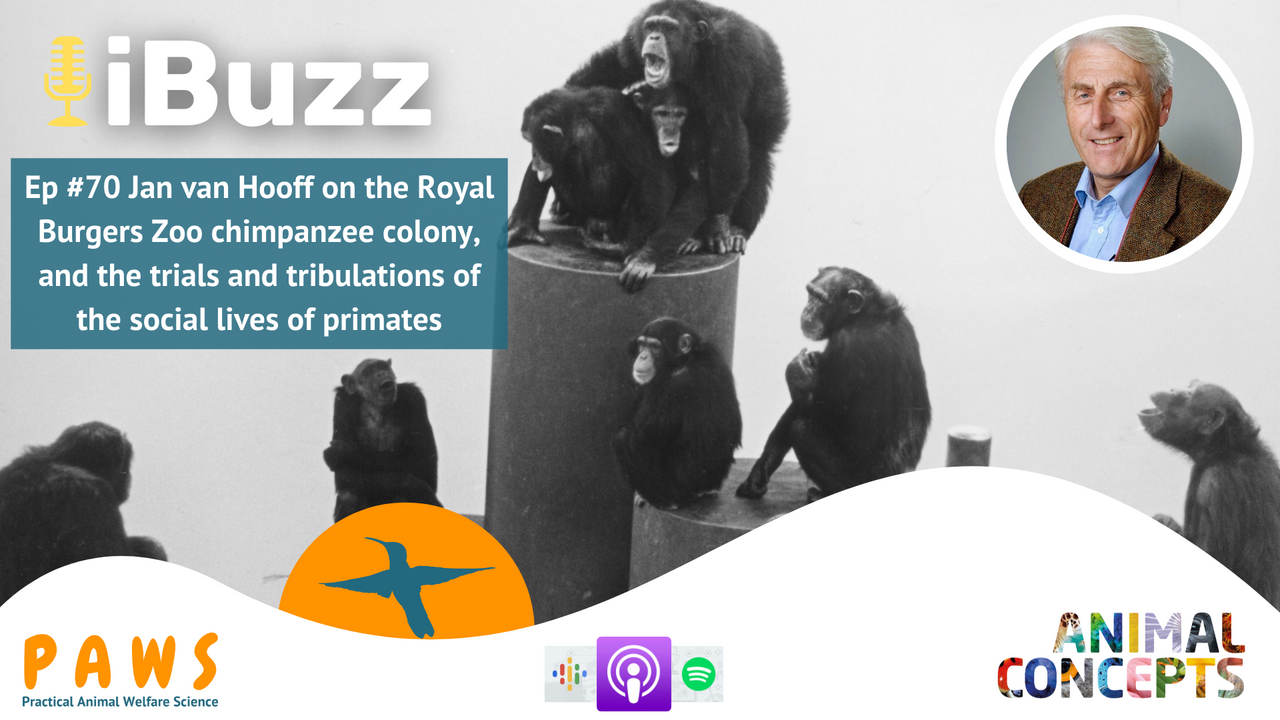
For today’s podcast, we once again welcome back Professor Jan van Hooff to share more of his stories and knowledge surrounding his experiences working with the chimpanzees at Burgers Zoo.
He explains how the large community of chimpanzees he came to work with was unheard of at the time. He draws on his experiences researching the chimpanzees housed in New Mexico by the United States Air Force to encourage and formulate a plan for keeping a colony of chimpanzees in captivity. He explains how, prior to the 1970s, chimpanzees in zoos were traditionally kept alone or in small groups in cages.
Professor van Hooff retells stories of how the colony at Burgers Zoo came to be, and the trials and tribulations of introducing such a large group of chimpanzees to each other. This included the struggle of introducing three adult males to a group of twenty-three adult and adolescent females. He draws particular attention to the oldest female Mama, who Jan explains had adopted the role that would ty...
Ep69 Jill Mellen & Sabrina Brando in a conversation about environmental enrichment
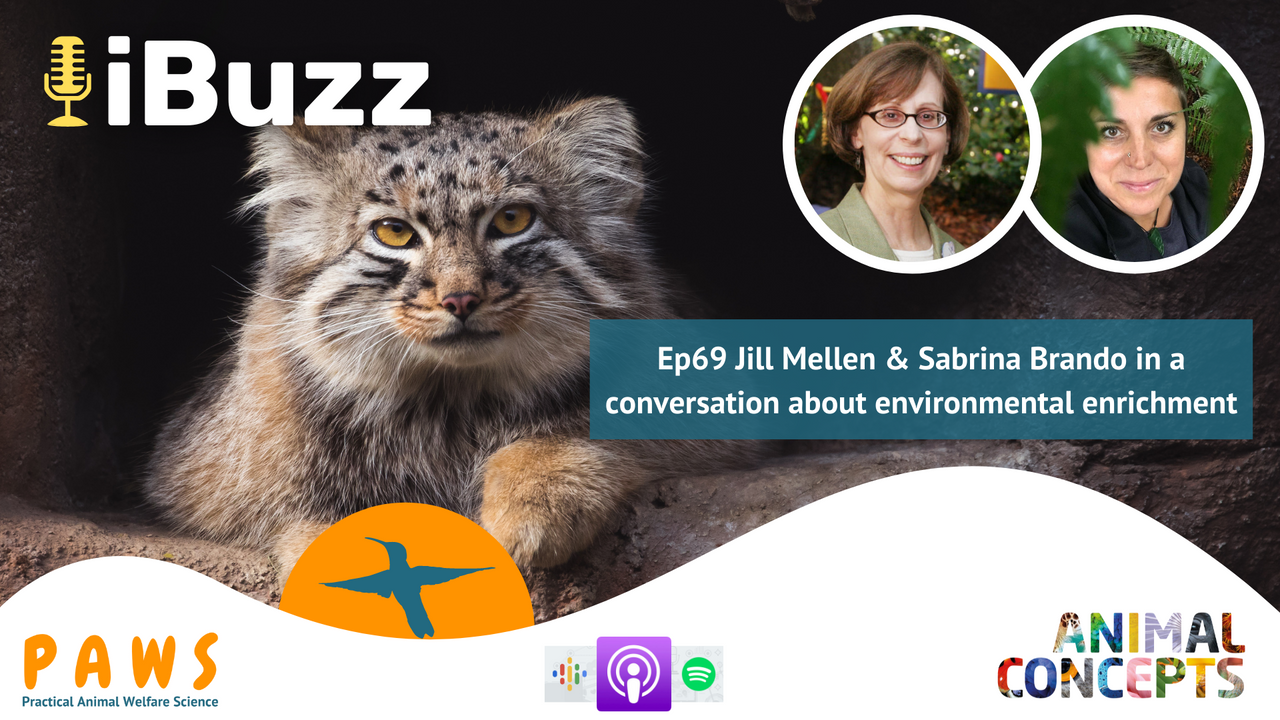
Dr Jill Mellen worked as the Education and Science Director at Disney’s Animal Kingdom and while now retired from this position, she is still very active in all kinds of projects! She has worked in the zoo and aquatic field for over three decades, with expertise in animal welfare. As such, in 2021, Jill received a lifetime achievement award for her work in animal welfare from the Association of Zoos and Aquariums.
Jill shares with us that beyond having a dog, her family had no interest in animals. Instead, Jill was inspired by her neighbours Velma and Karen who owned a horse. She went on to university to study for a BSc in Biology then an MSc in Animal Behaviour. Whilst studying, she acquired a job at Miller Park Zoo, Bloomington, Illinois where she worked with children and farm animals. This sparked her passion for zoo-based careers. Progressing from there, after her MSc Jill was hired to participate in environmental engineering and to train and supervise undergraduates at Oregon Zoo...
Ep68 Tim Sullivan on the yin and yang of animal training, crystal okapis, and a career benefitting animals

Having a background in marine mammal training, Tim Sullivan reflects on the impact his different mentors and the thorough coaching that he received has had on his career in caring for marine mammals. Tim reflects on his experience and discusses how the practice of animal training has changed over the years and whether it is logical to ask animals to carry out behaviours that do not come naturally to them.
Tim is a co-founder of the Animal Behaviour Management Alliance and he explains how the organisation got started alongside the benefits it has for collaborative working when training animals. Tim also shares anecdotes on how he has found exposing animals to change early on can help build up their resilience and reduce stress when variations in their routine may be unavoidable. Having a lot of experience in animal training, Tim shares the value of being proactive in animal behaviour management to avoid problematic behaviours, such as stereotypies, from occurring.
Listen on your favou...

